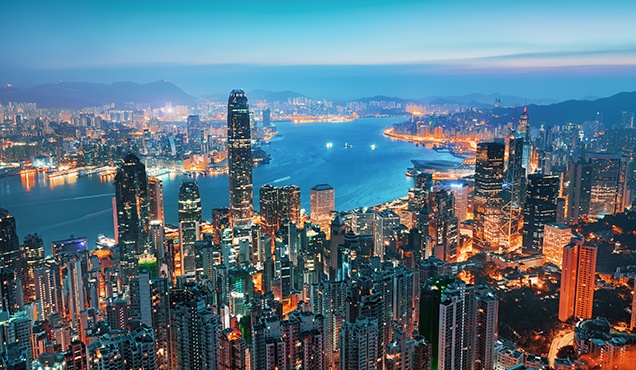Hong Kong profile

Hong Kong (HK) is a special administrative region (a kind of Special Region) in the People's Republic of China. That status also belongs to Macau, a former Portuguese colony. The area is HK 1,104 km2 with a population of about 7 million. The population of HK consists of ethnic Chinese (95%) and other ethnicities (5%). The majority are ethnic Han from Guangzhou and Taishan, two neighboring cities of Guangdong Province.
With the principle of "one country, two systems", the political and economic system of HK is different from the Chinese government. HK adopts a democratic-capitalist system and is one of the leading international financial centers in the world. Its currency, the Hong Kong Dollar (HKD, HK $), is the 9th most widely used currency in the world.
The HK political system is governed by the Basic Law of Hong Kong, its constitutional document, which grants HK "a high degree of autonomy" in all aspects except foreign relations and military defense. The HK government is led by a Chief Executive who is elected by around 800 members of the Election Committee.
HK became a British colony after the First Opium War (1839-1842). Starting from HK Island, the British colony expanded into the Kowloon Peninsula and New Territories in 1898. Previously, the two territories were controlled by Japan during the Pacific War.
Asa Suggests the Word "Hong Kong"
The name “Hong Kong” (HK) is from the Cantonese language or the name Hakka which means “fragrant harbor” in English. Before 1842, the name originally referred to the inlet - now Aberdeen Harbor / Little Hong Kong - between the island of Ap Lei Chau and the southern side of HK Island.
History
The HK Islands became a British colony since January 20, 1841. Inggus also controlled the Kowloon Peninsula and Stonecutter's Island in 1860 after defeating China in the Second Opium War.
In 1941 the Japanese army invaded and ruled Hong Kong, 8 December 1941 until Japan surrendered to the allied forces in the Second World War in 1945. HK was again controlled by the British until 1997.
On July 1, 1997 Britain handed over HK to China and became the first special administrative region in China. Tung Chee Hwa was elected as the first Chief Executive.
Government
The Hong Kong government is headed by a Chief Executive. He leads all government affairs, except for Foreign Relations and Military Defense which is directly controlled by Beijing.
HK government institutions consist of the Executive, Legislative and Courts. The executive is headed by a Chief Executive who is elected by the Executive Committee and then appointed by the Central People's Government. The Legislative Council has 60 members and is chaired by the President of the Legislative Council.
The HK government has traditionally played a passive role in the economy, a policy known as “positive non-interventionism”. Hong Kong is often cited as an example of laissez-faire capitalism (laissez-faire capitalism). Hong Kong has been an industrial nation and the world's financial center since the 1990s.
Demography
The current population of HK is 7,03 million. About 95% of the population is of Chinese descent, the majority of Taishanese, Chiu Chow, other Cantonese people, and Hakka. The majority of ethnic Han HK come from Guangzhou and Taishan.
About 5% other immigrants from South Asia, such as India, Pakistan, Nepal, as well as Vietnam. There are also residents from Europe, America, Canada, Japan and Korea. In addition, there are around 300.000 domestic helpers currently working in HK, the majority from Indonesia (about 150.000 people) and the Philippines.
Language
The colloquial language of HK residents is Cantonese (Cantonese), Chinese from Guangdong Province to northern HK. English is also the official language and according to the 1996 census it is used by 3,1% of the population in their daily relationships and by 34.9% of the population as a second language.
Mandarin Chinese also began to be widely spoken as immigrants from mainland China increased to HK.
Agama
Freedom of religion applies in Hong Kong, protected by the "Basic Law of Hong Kong". About 90% of the population adheres to Buddhism (mainly Chinese Mahayana), Confucianism and Taoism.
Christianity is practiced by around 600,000 or 8% of the total population. There are also Sikhs, Muslims, Jews, Hindus and Bahá'í communities.
Transportation
HK transportation using Ferry, MTR (Subway), Bus, Taxi and Tram. More than 90% of HK residents use this public transportation. Only 10% use private vehicles. The fee is using an Octopus card and cash. The all-way tram costs 2 HK dollars for adults and 1 dollar for children and seniors.
The subway express train (MTR) has 150 stations and serves 3.4 million people per day. Hong Kong Tramways has been operating since 1904. Double double-decker buses were introduced since 1949.
Highway concreted. Traffic is relatively orderly and smooth. Sidewalks for pedestrians are safe from street vendors or any obstruction. Orderly traffic for motorists and pedestrians makes roads free of traffic jams and minimal accidents.
Climate
Hong Kong is one of the countries in Asia which has four seasons: spring, summer, autumn and winter.
- Spring: March to Mid May, the average temperature is 23 degrees Celsius.
- Summer: Late May to Mid September, the average temperature is 28 - 33 degrees Celsius.
- Autumn: Late September to Early December, average temperature 23 degrees Celsius.
- Winter: Mid-December to February, the average temperature is 17 degrees Celsius.
VISA
Hong Kong is a country that exempts visas or can get a "visa on arrival" (getting a visa at the local airport) for Indonesian passport holders. Indonesian citizens can visit Hong Kong & Macau for 30 days without a visa, however a visa is required for those who will work, study, undergo training or live permanently. (ASM. Romli, compiled from various sources and observations, had been to Hong Kong in 2009, 2010 and 2012). *